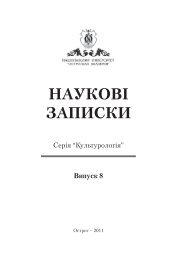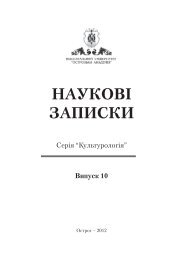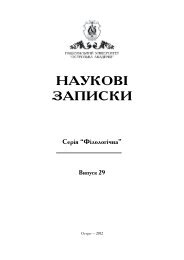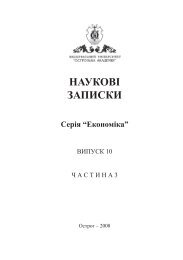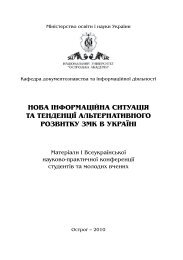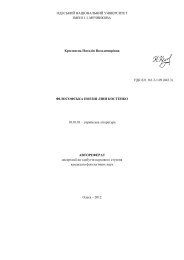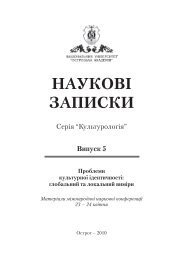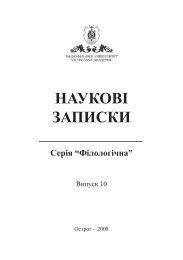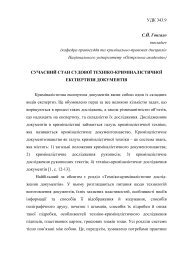6Наукові записки. Серія “Економіка”. Випуск 10.far from presenting a unified model, Shleifer [4] shows the limits ofarbitrage as a mechanism of the EMH and points as well to theresulting policy implications.More fundamentally, empirical psychology saved economicsfrom moving too far from reality, leaving an evident risk that thefalse belief becomes self-referential and self-confirming. Sincethen, by making a ,,psychological turn’’ [5], strong evidence wasfound to move away from the ,,rational egoist’’ and the efficientmarket hypothesis, but mainstream financial theory still clings tothe misunderstanding of concluding from probability distribution(description) to calculation (understanding), which impliesunderstanding. After all, human behaviour is heavily bounded bycognitive limits [6], and heavily influenced by social behaviourof others (e.g. market participants) [7], that is in turn mainlyreflected in expectations as a component of market prices andmarket stability. Institutions themselves rest on the expectationthat they provide stability. So we should keep in mind, that theEMH has mainly a cognitive function to make market participantsbelieve that the market is efficient. If this belief is at risk, eventhe market institutions are object to downward self-dynamics. Aslong as a sufficient number of market participants follows marketrules, the market can fulfil its function. Since EmMa’s only startto incorporate their economies into world markets, they face adouble challenge: The volatility of world markets and they ownadjustment volatility triggered by the change from administrativeprices to market prices. Institutionally, often they still have todecentralize decision making power and to build up reputation ofnewly independent central banks [8].Among other functions, the central bank is the agent to manageexpectations of market participants about price stability and exchangerates. It should be assigned the necessary decision making power andthe institutional capacity to fulfil that function. It includes refrainingfrom funding state budget and independence of monetary decisionsfrom political interference, since its independence is a preconditionfor trust. There is striking evidence for the great importance of trustin the central bank for the effectiveness of monetary policy, [9]resulting in low inflation. As well, it is a condition for its politicalsupport. Conversely, high inflation endangers central banksindependence, since it will lack political support or even worse, facecontradicting fiscal policies [10].Having started with linking money supply to quantitativelylimited materials (e.g. gold, silver), the excessive demand (e.g. tofinance wars) and supply (over-consumption at too low interest
Фінансова система України. Частина 1. 7rates) of money itself is a source of volatility, which in turn decreaseseconomic activity and creates social distortions. Central bankshould appear as an agency that functions as a psychological anchorfor market participants to orient themselves, because the marketexpectations of future prices contains the risk of a self fulfillingprophecy. This holds true for all assets, since the mechanism is acognitive-social one. The extent to which it appears over certainasset classes may differ. Of utmost important should be consumerprice stability. However, in a globalized economy price expectationsfor currencies, stocks and bonds are of the higher importance, themore a country relies on them as a major source of funding or themore the wealth of the nation depends on international trade.To illustrate the impact of inflation, a comparison between realand nominal value of assets broadens the view and can clear up thesubjective feeling of wealth. Beside that it complements the pictureof reasons why a central bank has to pursue an anti-inflationarypolicy – simply to keep the wealth of the nation. As an examplewe choose the nominal and real development of the Dow JonesIndustrial Average (DJIA). The chart shows the advantage ofinvestment strategies which avoid loss from inflation.In the period from 1966 until 1982, an investor with an index investmentin the DJIA kept about his nominal value, but in real termsthe index fell from about 500 points to about 150 points, which meansa loss of 2/3 (excluding dividends). A Japanese investor, in ves ting1966 from the Japanese Yen in the DJIA in Dollar terms, in vested1966 at an exchange rate of about 360 Yen/Dollar. Given a re turn toYen in 1982 he would have changed back at a rate of about 240 Yen/Dollar, loosing additional 1/3 of its investment. Beside that, an USinvestor,investing in the DJIA index in 1966, had to be in ves ted until1996 to return to even in real terms, waiting 30 years! Meanwhile,in 1996 FEDchair man AlainGreen span stated:"[...] Clearly,sustained lowinflation impliesless uncertaintyabout the future,and lower riskpremiums implyhigher prices ofstocks and other
- Page 1 and 2: НАУКОВІЗАПИСКИСер
- Page 3 and 4: ТРАНСФОРМАЦІЯБЮДЖ
- Page 5: Фінансова система
- Page 10 and 11: 10Наукові записки. С
- Page 12 and 13: 12Наукові записки. С
- Page 14 and 15: 14Наукові записки. С
- Page 16 and 17: 16Наукові записки. С
- Page 18 and 19: 18Наукові записки. С
- Page 20 and 21: 20Наукові записки. С
- Page 23 and 24: Фінансова система
- Page 25 and 26: Фінансова система
- Page 27 and 28: Фінансова система
- Page 29 and 30: Фінансова система
- Page 31 and 32: Фінансова система
- Page 33 and 34: Фінансова система
- Page 35 and 36: Фінансова система
- Page 37 and 38: Фінансова система
- Page 39 and 40: Фінансова система
- Page 41 and 42: Фінансова система
- Page 43 and 44: Фінансова система
- Page 45 and 46: Фінансова система
- Page 47 and 48: Фінансова система
- Page 49 and 50: Фінансова система
- Page 51 and 52: Фінансова система
- Page 53 and 54: Фінансова система
- Page 55 and 56: Фінансова система
- Page 57 and 58:
Фінансова система
- Page 59 and 60:
Фінансова система
- Page 61 and 62:
Фінансова система
- Page 63 and 64:
Фінансова система
- Page 65 and 66:
Фінансова система
- Page 67 and 68:
Фінансова система
- Page 69 and 70:
Фінансова система
- Page 71 and 72:
Фінансова система
- Page 73 and 74:
Фінансова система
- Page 75 and 76:
Фінансова система
- Page 77 and 78:
Фінансова система
- Page 79 and 80:
Фінансова система
- Page 81 and 82:
Фінансова система
- Page 83 and 84:
Фінансова система
- Page 85 and 86:
Фінансова система
- Page 87 and 88:
Фінансова система
- Page 89 and 90:
Фінансова система
- Page 91 and 92:
Фінансова система
- Page 93 and 94:
Фінансова система
- Page 95 and 96:
Фінансова система
- Page 97 and 98:
Фінансова система
- Page 99 and 100:
Фінансова система
- Page 101 and 102:
Фінансова система
- Page 103 and 104:
Фінансова система
- Page 105 and 106:
Фінансова система
- Page 107 and 108:
Фінансова система
- Page 109 and 110:
Фінансова система
- Page 111 and 112:
Фінансова система
- Page 113 and 114:
Фінансова система
- Page 115 and 116:
Фінансова система
- Page 117 and 118:
Фінансова система
- Page 119 and 120:
Фінансова система
- Page 121 and 122:
Фінансова система
- Page 123 and 124:
Фінансова система
- Page 125 and 126:
Фінансова система
- Page 127 and 128:
Фінансова система
- Page 129 and 130:
Фінансова система
- Page 131 and 132:
Фінансова система
- Page 133 and 134:
Фінансова система
- Page 135 and 136:
Фінансова система
- Page 137 and 138:
Фінансова система
- Page 139 and 140:
Фінансова система
- Page 141 and 142:
Фінансова система
- Page 143 and 144:
Фінансова система
- Page 145 and 146:
Фінансова система
- Page 147 and 148:
Фінансова система
- Page 149 and 150:
Фінансова система
- Page 151 and 152:
Фінансова система
- Page 153 and 154:
Фінансова система
- Page 155 and 156:
Фінансова система
- Page 157 and 158:
Фінансова система
- Page 159 and 160:
Фінансова система
- Page 161 and 162:
Фінансова система
- Page 163 and 164:
Фінансова система
- Page 165 and 166:
Фінансова система
- Page 167 and 168:
Фінансова система
- Page 169 and 170:
Фінансова система
- Page 171 and 172:
Фінансова система
- Page 173 and 174:
Фінансова система
- Page 175 and 176:
Фінансова система
- Page 177 and 178:
Фінансова система
- Page 179 and 180:
Фінансова система
- Page 181 and 182:
Фінансова система
- Page 183 and 184:
Фінансова система
- Page 185 and 186:
Фінансова система
- Page 187 and 188:
Фінансова система
- Page 189 and 190:
Фінансова система
- Page 191 and 192:
Фінансова система
- Page 193 and 194:
Фінансова система
- Page 195 and 196:
Фінансова система
- Page 197 and 198:
Фінансова система
- Page 199 and 200:
Фінансова система
- Page 201 and 202:
Фінансова система
- Page 203 and 204:
Фінансова система
- Page 205 and 206:
Фінансова система
- Page 207 and 208:
Фінансова система
- Page 209 and 210:
Фінансова система
- Page 211 and 212:
Фінансова система
- Page 213 and 214:
Фінансова система
- Page 215 and 216:
Фінансова система
- Page 217 and 218:
Фінансова система
- Page 219 and 220:
Фінансова система
- Page 221 and 222:
Фінансова система
- Page 223 and 224:
Фінансова система
- Page 225 and 226:
Фінансова система
- Page 227 and 228:
Фінансова система
- Page 229 and 230:
Фінансова система
- Page 231 and 232:
Фінансова система
- Page 233 and 234:
Фінансова система
- Page 235 and 236:
Фінансова система
- Page 237 and 238:
Фінансова система
- Page 239 and 240:
Фінансова система
- Page 241 and 242:
Фінансова система
- Page 243 and 244:
Фінансова система
- Page 245 and 246:
Фінансова система
- Page 247 and 248:
Фінансова система
- Page 249 and 250:
Фінансова система
- Page 251 and 252:
Фінансова система
- Page 253 and 254:
Фінансова система
- Page 255 and 256:
Фінансова система
- Page 257 and 258:
Фінансова система
- Page 259 and 260:
Фінансова система
- Page 261 and 262:
Фінансова система
- Page 263 and 264:
Фінансова система
- Page 265 and 266:
Фінансова система
- Page 267 and 268:
Фінансова система
- Page 269 and 270:
Фінансова система
- Page 271 and 272:
Фінансова система
- Page 273 and 274:
Фінансова система
- Page 275 and 276:
Фінансова система
- Page 277 and 278:
Фінансова система
- Page 279 and 280:
Фінансова система
- Page 281 and 282:
Фінансова система
- Page 283 and 284:
Фінансова система
- Page 285 and 286:
Фінансова система
- Page 287 and 288:
Фінансова система
- Page 289 and 290:
Фінансова система
- Page 291 and 292:
Фінансова система
- Page 293 and 294:
Фінансова система
- Page 295 and 296:
Фінансова система
- Page 297 and 298:
Фінансова система
- Page 299 and 300:
Фінансова система
- Page 301 and 302:
Фінансова система
- Page 303 and 304:
Фінансова система
- Page 305 and 306:
Фінансова система
- Page 307 and 308:
Фінансова система
- Page 309 and 310:
Фінансова система
- Page 311 and 312:
Фінансова система
- Page 313 and 314:
Фінансова система
- Page 315 and 316:
Фінансова система
- Page 317 and 318:
Фінансова система
- Page 319 and 320:
Фінансова система
- Page 321 and 322:
Фінансова система
- Page 323 and 324:
Фінансова система
- Page 325 and 326:
Фінансова система
- Page 327 and 328:
Фінансова система
- Page 329 and 330:
Фінансова система
- Page 331 and 332:
Фінансова система
- Page 333 and 334:
Фінансова система
- Page 335 and 336:
Фінансова система
- Page 337 and 338:
Фінансова система
- Page 339 and 340:
Фінансова система
- Page 341 and 342:
Фінансова система
- Page 343 and 344:
Фінансова система
- Page 345 and 346:
Фінансова система
- Page 347 and 348:
Фінансова система
- Page 349 and 350:
Фінансова система
- Page 351 and 352:
Фінансова система
- Page 353 and 354:
Фінансова система
- Page 355 and 356:
Фінансова система
- Page 357 and 358:
Фінансова система
- Page 359 and 360:
Фінансова система
- Page 361 and 362:
Фінансова система
- Page 363 and 364:
Фінансова система
- Page 365 and 366:
Фінансова система
- Page 367 and 368:
Фінансова система
- Page 369 and 370:
Фінансова система
- Page 371 and 372:
Фінансова система
- Page 373 and 374:
Фінансова система
- Page 375 and 376:
Фінансова система
- Page 377 and 378:
Фінансова система
- Page 379 and 380:
Фінансова система
- Page 381 and 382:
Фінансова система
- Page 383 and 384:
Фінансова система
- Page 385 and 386:
Фінансова система
- Page 387 and 388:
Фінансова система
- Page 389 and 390:
Фінансова система
- Page 391 and 392:
Фінансова система
- Page 393 and 394:
Фінансова система
- Page 395 and 396:
Фінансова система
- Page 397 and 398:
Фінансова система
- Page 399 and 400:
Фінансова система
- Page 401 and 402:
Фінансова система
- Page 403 and 404:
Фінансова система
- Page 405 and 406:
Фінансова система
- Page 407 and 408:
Фінансова система
- Page 409 and 410:
Фінансова система
- Page 411 and 412:
Фінансова система
- Page 413 and 414:
Фінансова система
- Page 415 and 416:
Фінансова система
- Page 417 and 418:
Фінансова система
- Page 419 and 420:
Фінансова система
- Page 421 and 422:
Фінансова система
- Page 423 and 424:
Фінансова система
- Page 425 and 426:
Фінансова система
- Page 427 and 428:
Фінансова система
- Page 429 and 430:
Фінансова система
- Page 431 and 432:
Фінансова система
- Page 433 and 434:
Фінансова система
- Page 435 and 436:
Фінансова система
- Page 437 and 438:
Фінансова система
- Page 439 and 440:
Фінансова система
- Page 441 and 442:
Фінансова система
- Page 443 and 444:
Фінансова система
- Page 445 and 446:
Фінансова система
- Page 447 and 448:
Фінансова система
- Page 449 and 450:
Фінансова система
- Page 451 and 452:
Фінансова система
- Page 453 and 454:
Фінансова система
- Page 455 and 456:
Фінансова система
- Page 457 and 458:
Фінансова система
- Page 459 and 460:
Фінансова система
- Page 461 and 462:
Фінансова система
- Page 463 and 464:
Фінансова система
- Page 465 and 466:
Фінансова система
- Page 467 and 468:
Фінансова система
- Page 469 and 470:
Фінансова система
- Page 471 and 472:
Фінансова система
- Page 473 and 474:
Фінансова система
- Page 475 and 476:
Фінансова система
- Page 477 and 478:
Фінансова система
- Page 479 and 480:
Фінансова система
- Page 481 and 482:
Фінансова система
- Page 483 and 484:
Фінансова система
- Page 485 and 486:
Фінансова система
- Page 487 and 488:
Фінансова система
- Page 489 and 490:
Фінансова система
- Page 491 and 492:
Фінансова система
- Page 493 and 494:
Фінансова система
- Page 495 and 496:
Фінансова система
- Page 497 and 498:
Фінансова система
- Page 499 and 500:
Фінансова система
- Page 501 and 502:
Фінансова система
- Page 503 and 504:
Фінансова система
- Page 505 and 506:
Фінансова система
- Page 507 and 508:
Фінансова система
- Page 509 and 510:
ЗмістТРАНСФОРМАЦІ
- Page 511 and 512:
Фінансова система
- Page 513 and 514:
Фінансова система



